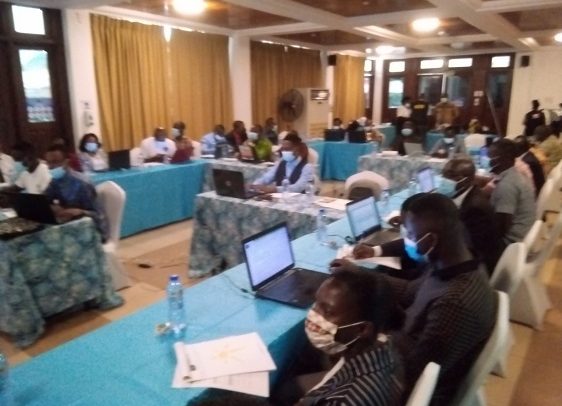Some of the participants
The Bank of Ghana has called on all stakeholders, including Rural and Community Banks (RCBs) as well as Microfinance Institutions (MFIs) to ensure compliance with the existing laws and regulations.
He said the move will help build and sustain a robust Anti-Money Laundering (AML) and Combating Financing of Terrorism (CFT) regime.
Mr George Nkrumah, Head of Financial Integrity Department of the BoG who disclosed this said in June, this year, Ghana came off the Financial Action Task Force (FATF) grey list after the international Cooperation Review Group (CRG) of FATF conducted its on-site examination on Ghana in May this year.
He said to remain off the grey list, all stakeholders in the fight against Money Laundering and Terrorist Financing (TF) will have to ensure compliance with the laws and regulations.
Mr Nkrumah was speaking during the official opening of a four-day training workshop for rural banks and Microfinance Institutions (MFIs) in the Western and Central regions.
It was to sensitise the participants on Anti-Money Laundering and Counter Terrorism Fighting (AML/CFT) activities, to ensure a clean financial sector and also enhance public confidence and trust in the financial sector.
It was also aimed at equipping the institutions with the needed skills on how to report on suspected money laundering activities and how to combat them.
Participants were taken through one of the key aspects of the Continuous Due Diligence (CDD) process of Transaction Monitoring (TM) among others.
“Most rural banks and MFIs, lack the technical and technological know-how to implement robust systems to fight the crime, hence, the training,” he disclosed.
He revealed that Ghana is reasonably compliant with the technical requirements of Anti-Money Laundering.
However, the emphasis of the BoG is on the effectiveness of supervisory activities and preventive measures.
He also stressed that the workshop will facilitate the registering of the financial institutions on the GoAML, which is an Anti-Money Laundering platform.
“This will go a long way to improve reporting to the Financial Intelligence Centre (FIC) by institutions in the sector and enhance collaboration between competent authorities,” he added.
From Emmanuel Opoku, Takoradi


